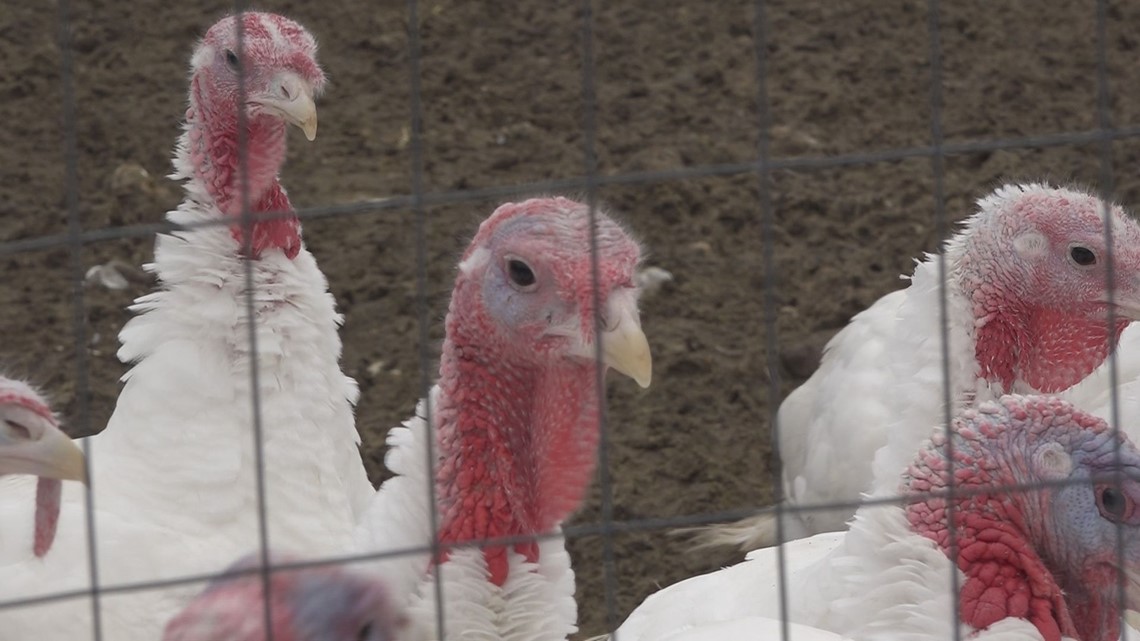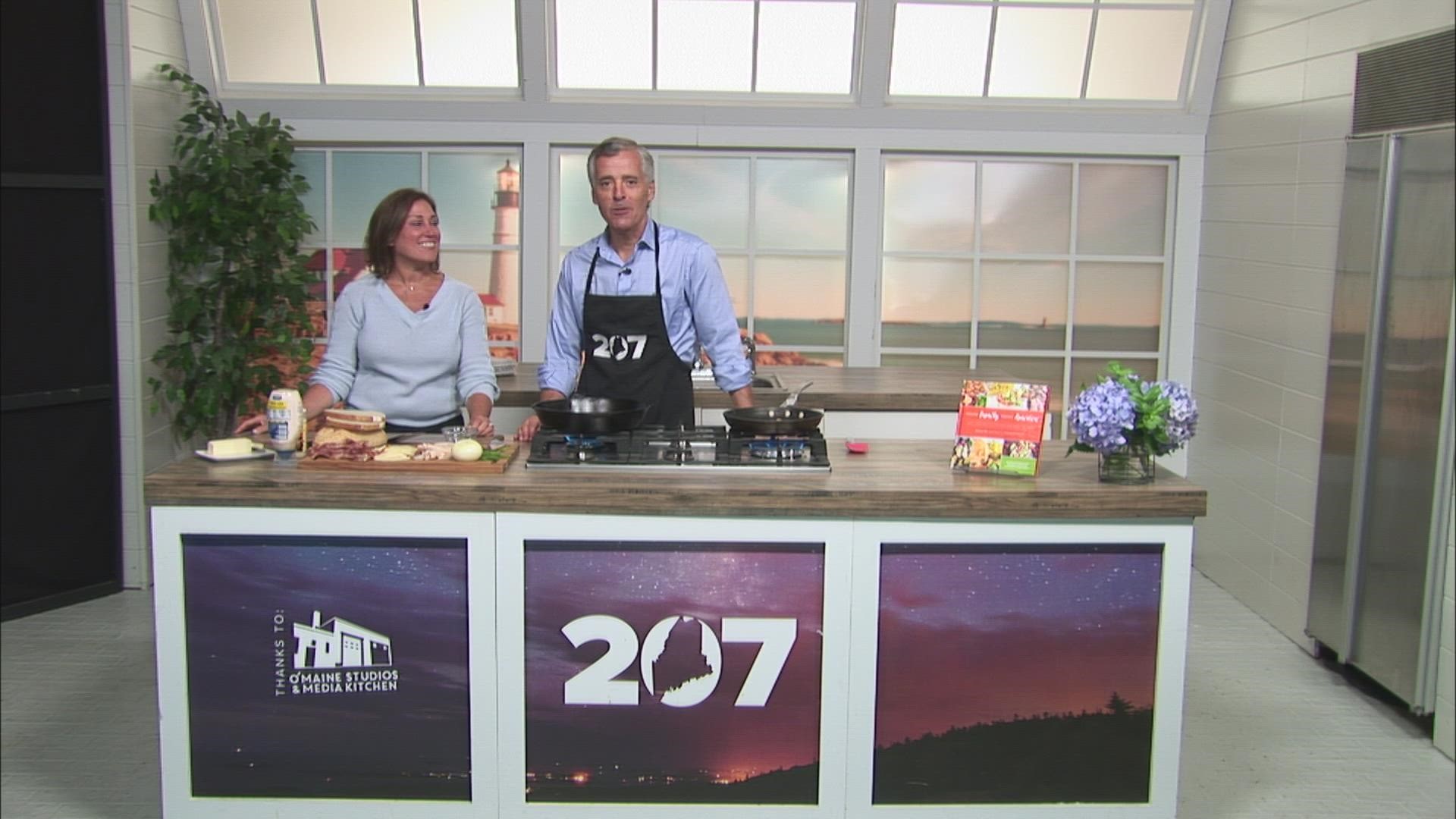PORTLAND, Maine — The pandemic has changed life for everyone, including where some turn to buy their food. A growing interest in buying meat and produce directly from Maine farms has some farmers saying they've run out of turkeys before Thanksgiving.
40 years of turkeys
Scott Greaney said he's been selling turkeys for 40 years and owns Greaney's Turkey Farm in Mercer. The farmer described turkey sales this year as "brisk" and said the season started in September when people began calling about the Thanksgiving favorite.
"We've never sold turkeys that early in my 40 years of being involved in selling turkeys," Greaney said. "September, you'd never sell them in September."
He added turkey sales usually start after Halloween, and normally 75% of all turkeys farmers sell are sold a week to 10 days before Thanksgiving.
"What the heck is going on," he said.
Greaney said customers were convinced there was going to be a shortage of turkeys, and he told them there'd be no shortage.
"We've peeled through 1,500 turkeys," the farmer said. And he was very close to being sold out in the first week of November, even from last year.
And the size of these birds some customers want has changed, too, according to the farmer. Last year everyone was looking for small turkeys because they weren't having big gatherings during the pandemic. This year, everyone wants birds between 25 and 30 pounds, Greaney said.
Half of the sales are birds well over 20 pounds because families are getting back together, according to the farmer. Customers don't want to pass up family time.
Even stores Greaney sells to are reporting people buying big birds. In fact, some customers are buying two turkeys in case the supply chain gets worse. A few even bought three turkeys because they want something for later in the year, according to Greaney.
"I think there's a little panic buying. I tell people 'calm down,'" he said. "The longer I'm in this business, the less I know."
Predicting the future
The turkey ordering process involves a bit of predicting future sales, Greaney explained. He contacted the hatchery in January and started looking at hatch dates.
"I have to try and predict almost nine months in advance what will be selling this year," he said.
Small birds? Large birds? This year he did two hatches, an early hatch for larger turkeys and a later hatch for small ones. He ordered around 1,000 of each this year.
"I just feel that guiding angel was sitting on my shoulder saying get some of both," the farmer said.
The turkey selling business comes down to flexibility and guiding customers, according to the farmer.
"It's just being flexible with people and giving people guidance on what options they have, even on cooking," he said.
Low-stress farm
When it comes to raising his birds, Greaney said he keeps the environment real low stress.
"Our birds are out in the pasture eating green grass. We baby our birds. We keep them real low stress so we don't have to deal with disease problems," the farmer said.
Greaney usually buys a couple of dump truckloads of sand and spreads it in the pasture. The birds will go out and climb all over it. He said they play in the sand.
While he said the pandemic has been a horrible thing, one upside has been people waking up to how brittle the national food chain is.
"You can buy pretty much everything you need from local farm stands," he said. "It's really [an] incentive for people to look into their local farmers. A lot of people have been pleasantly surprised, not only with quality but price."
Generations of customers
One of Greaney's favorite things to see in the business is generations of families coming to his farm.
"I like growing turkeys, but I love the people that come back year after year," he said. He's watched parents bring kids to his farm to buy birds, and then those kids grow up and bring their own children. The farmer said it makes him feel old.
In an average year, Greaney said he raises about 1,500 birds. And while he said there are bigger farms, his operation processes all their own turkeys. The farm has its own slaughterhouse where they can monitor each step from killing to cleaning.
"We want our birds to look good," he said.
The farmer said he gets to know the people who buy his birds by their first name. And he gets to know markets, too. For example, customers in Lewiston tend to want larger birds. Greaney said there are a lot of Catholic families there that have big gatherings. But in Portland? Smaller birds for smaller families.


Looking ahead to the rest of November, Greaney said most of the farmers he's talked to are sold out of birds. Friends have told him they should have bought more. One southern Maine farm he knows sold out in September, he said.
Some customers are actually getting big broiler chickens in place of turkeys, ones that weigh eight or nine pounds. Again, he added, people are looking back to Maine agriculture and family farms.
"It's been a good thing," he said.
Sold out
Chase Harris is co-owner of Harris Turkey Farm in West Newfield. He told NEWS CENTER Maine his farm starts taking orders in June and was sold out by July.
"Lots of people looking for turkeys but not able to find any," he said.
Harris said sales this year have been a little slower but still pretty quick overall.
"Last year we sold out in seven days," he said. "This year was six weeks."
In 2012, Maine had 266 farms that sold turkeys and around 5,500 turkeys. In 2017, the Pine Tree State had 245 farms that sold turkeys and around 7,700 turkeys. That's from the Census of Agriculture, according to Dr. Colt Knight, an assistant professor and state livestock specialist with the University of Maine Cooperative Extension.
Buying local
"As more people are buying local, they're more interested in humanely-raised animals," Colt said.
There's a trend in buying local. When the pandemic hit, and shelves went bare for a while, the number of local meat sales skyrocketed, according to the livestock specialist. Farmers in Maine couldn't keep up with the demand, he said. And Maine is seeing that continue into this year.
More and more farmers are setting up farm stores or going to farmers' markets and diversifying their operations. Beef farmers might start raising turkeys or pork to keep customers happy and coming back.
"I think turkeys are a logical step in that progression," Colt said. "I do think those numbers are increasing."
The professor said only two farms in Maine raise more than 2,000 turkeys a year, and most of them raise 30-40 turkeys a year. He's definitely seeing more locally-raised turkeys.
"I would think just from what I see in other livestock species we're going to be raising more turkeys this year than in pre-pandemic years just to meet that local demand just because people are scared of grocery stores being bare," he said.
Colt said in 2020 customers really flooded local farms wanting to buy local because grocery store shelves went bad. The customers were hoarding local meat.
"I thought that would end," he said. "It costs us a lot more to raise meat here in Maine than you can buy commodity meat for."
And yet, there's still a tremendous increase in local sales for that locally-produced protein. That trend will probably continue for several more years, according to the professor.
The livestock specialist said he's talked to meat producers, and they've had record sales this year at farm stores. It's shocked him customers kept buying.
"I'm happy to see folks buying locally this year," he said. "I think that's positive for the Maine farming economy."

